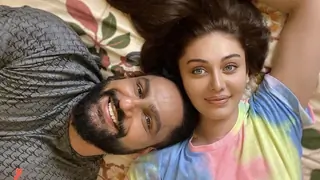Originally posted by: sashashyam
My dear Lashykanna,
You know, this time around I am curiously uncertain as to how to approach these two latest chapters (though I am sure No.11 will be out before I get this done!).
I do not like dissecting a delicate, gossamer weave, so fragile that the slightest pull can tear it. Or a very tender bud, with all its petals still tightly furled, with one little edge opening up, near the top, just a very little. There is the promise of a full bloom some day ahead - and no, I am not taking off from that dratted zergul flower - but I am almost afraid to delve too deep, to try and prise open the tightly closed petals too soon.
Yes.. the bud has to grow bigger before its full bloom, and it needs light, water, nutrients and supplements. The temperature and humidity are to be manipulated and this can be done only by the gardener.
On the edge of the unknown: This is where your Akbar and Heera are now, trembling on the edge of something neither understands, and one resents. No, that is not quite correct. That both resent. Thus Heera:
'Stop!' she shook her head - for, even in that troubled state, her subconscious knew the answers to all those questions. She'd lost her sense of composure, because she was annoyed with HERSELF. Annoyed with her mind for having acted illogically. Annoyed with her heart for having briefly misbehaved. Even if only for a moment, this unfamiliar 'misbehaviour' had somehow sneaked in - and shrouded her judgement.
Because try as she might, she couldn't deny that for a little while, she'd earnestly welcomed a gift that she assumed, was from the man. From a complete stranger!.. Why had she lost her sense of judgement and acted that way?
So she tries to rationalize it : Was it because her mind was eager for some distraction to escape the anguish it was suffering? Or, was life so lonely that she'd become desperate for some intelligent company after the demise of her jiji?
Which is almost correct, as you yourself had explained the other day. Almost, but not quite.
Shyamala, I have inserted a couple of poems I found on the internet to describe her feelings.. please see P131 in this thread.
Confused resentment: And of course Akbar, as he fights a growing he-knows-not-what. There are little snippets, even before the very last segment, that bring this out unmistakably. Thus during the scene with the horses in the meadow and Heera tending the herb patch in the garden:
And as they passed by the fence thereafter, his glances incidentally fell upon the pair of fair palms toiling away on the other side - inspecting and caring for those tender leaves with exquisite care. Palms that were graceful with whatever they handled, skillful with whatever they touched - be it 4 dams in a forest, or a few flowers in a garden...
A host of other questions - vague questions - were suddenly bothering his logical mind - like why had he ended up halting there for longer than he must have '
Earlier, after the opening scene ( which, blessedly, continues exactly where it was left off at the end of Chapter 8!) Akbar must surely have mused, with a sense of confused irritation, over what it was that made him ask Heera those questions - not just about how she managed with her disability, but about how it had happened - that were too personal for a stranger to ask a high born lady.
And then wish her good night with a phrase that made him seem, for that fleeing moment, like one of her own kind. Why had he done that? Why had he then, instinctively, sought to bridge the gulf that separated them - a gulf of race and religion and culture and tradition?
There are no answers, at least none that he can accept, or even tolerate. So Akbar repeatedly fingers the place where his brown topaz ring used to be, and its very absence reminds him more of what he wishes to banish from his mind that its continued presence would have: the beautiful, hazel brown eyes of this girl who has catapulted herself into his life. A girl who is a mystery, a mystery that threatens to suck him into its vortex against his will.
It all boils over, this helpless resentment, by the time the closing segment comes along. He cannot look at his own gardens from the terrace without instinctively zeroing in on the herb patch that is now under Heera's care. A patch which
was going to grow to become the most beautiful aspect of the entire haveli. Even in the sparse light of night, those saplings and flower beds appeared so tender and promising - as if hinting to anyone who gazed upon them, of the nature of the Sahiba who'd planted them.
This brought to my memory a scene in a recent Tamil movie "KaLavaaNi",which was set in a village background. The hero is supervising the "nadavu" (planting of paddy saplings) in the field. His lover comes there and he asks her to plant some. After some weeks, when he passes by that side, he finds that the crop in the patch where she had sown the saplings had grown remarkably taller than the rest..!
The keeper of the flame: It is not just his admiration for Heera's never say die spirit, for the kind of cool courage that he has never before seen in a woman, for her tenacity, for her special skills, though that admiration is real, and is given without any resistance from his mind. It is something else. Something more.
Why does Akbar feel that he is stumbling headlong into unknown depths, into a chasm that might have no end? Is it because thinking of Heera has, unbeknownst to himself, set off a chain reaction? Thus:
the thoughts were beginning to ruffle other memories too. Memories so evasive that they'd somehow found their way through all his walls and masks he'd kept intact for so long. Subtle memories, which had stubbornly lodged in a far corner of his mind - that try as he might, he couldn't oust them.
I am sure most of your readers are all agog to find out, as soon as possible, what exactly are these shades from his past that haunt Akbar. But I am not one of them. I am content to wait till you are ready to open up those cards.
"The world may stay out I've built up a wall
My fragile lie will collapse should it ever fall
Waiting for someone to see I wear a mask
And care enough to remove it...is it too much to ask?"
For now, what touched me to the core was the welling anger, the unfamiliar tightening of the chest, that Akbar feels when brooding over the threat to Heera's life. Lashykanna, these are the most exquisite, the most evocative lines you have written here as yet:
Was it because his subconscious knew her spirit was unique, too unique to allow it to be extinguished? Was it because he knew she was a noble soul - a soul so noble that it would make any man want to protect its essence from dying out, though she'd never ask for such protection herself?
No, this is not, not yet, romantic love. It is something better, purer, lovelier.
For it is very rare for a man to value a woman so highly not because of what she means to him, or what she could become for him in personal terms, but because of what she is in herself.
A creature so evolved that she is far above the common run of womankind , in fact of humankind itself.
His nascent protectiveness towards her is not just that of a man towards a woman who has, all too soon and against his own will, ensconced herself firmly in his zehen.
It is the protectiveness of the keeper of a sacred flame that he is determined shall not go out. And that is going, unless I am badly mistaken, to be the leit motif of your fascinating tale.
The rest: This is going to be a bunching together, in no particular order, of all that struck me specially in these chapters. Naturally, a good bit of it will be about Heera!
-The incredible courage with which she forces herself to relive Durga's horrible last moments, and then to actually put that down on paper for others to read. It is difficult to even imagine what that must have cost her. I could not have done it.
- The untiring focus with which she drafts and redrafts her appeal for help, and then fine tunes and polishes its text. I have done this sort of thing, testing every phrase and every word both for content and for their not being, even inadvertently, negative or capable of being misinterpreted, so often that I can understand perfectly what kind of effort that exercise would have called for. And I am not referring just to her stiff neck! Heera does it, despite the additional strain of having to peer at the scrolls thru her reading stone.
-The astuteness and the grasp of human psychology that she displays in first trying out, and thus testing the impact of her missive on her guards. And then concluding that if her account of the outrage could have such a strong effect on those familiar with all that happened, then its impact be on those to whom it was unknown would be far greater, and so the letter would do its job.
-How good a leader Heera is was demonstrated once again when she listens patiently to all that Gokul reports so enthusiastically to her: about his having found out all about Chanda and Parvez, and that the meeting behind the marketplace was innocuous after all. She of course knows all this, having been told of it by Akbar himself, but she takes care not to let her guard know that.
Had she not done so, Gokul would have felt that his work, about which he is so pleased, was all unnecessary and a waste, and his morale would have plummetted. It is very important to let one's staff know from time to time that their work is appreciated, and one must never be dismissive or give them the impression that what they have accomplished is no longer important. This again is something I have always taken care to avoid both in my office, when I had one, and at home.
On the other hand, she does not fail to crack the whip when need be, as with her silly, chattering maids after the zergul mystery has been cleared up: I hope... at least after this occasion, you'd think twice, before you speak! If not... I shall begin tending to my work, by myself... without your assistance!
-The unflinching resolve with which she undertakes a medical procedure she has never done by herself before, and lances Mohan's abcess. In another place and time, Heera would have undoubtedly become a skilled surgeon.
-The girlish curiosity with which Heera discreetly peers across the fence at Bahadur and Akbar. The way in which her concentration for once wavers when she realises that not just his men, but the Khan Sahib himself is watching her at work with her herbs. And most of all, the sudden quickening of her heartbeats when she feels " a coincidental thrill" at having received, as she assumes, such an exquisite floral offering from someone as remote and introverted as the Khan Sahib.
I found all this most appealing, for it shows that there is a real, normal 16 year old as well behind all that unbelievable maturity and that patient courage.
-But what moved me the most, more even than Heera's unfailing strength, which she dredges up for the sake of her people and of Parnagarh, was the way in which she lets go at last, and weeps helplessly, clutching the ashes of her dead jiji, as she thinks of the last farewell she will bid Durga on the morrow. I felt like gathering her up in my arms and consoling the poor child as best I could.
-I like Akbar's Three Musketeers and their saucy chatter far more than I do Heera's chaffinch-like bunch of maids, Gauri being the exception.
They are a cheeky lot - Ibrahim, Azeez and Sayyid - always sailing close to the wind of Akbar's disapproval, at times braving swift chastisement, whether with a rolled up scroll or with a well aimed dagger. I also like Akbar's Chacha jaan, though how he can be his real chacha is as yet unclear. His crack about getting the Parnagarh Maharaj as dowry was wickedly funny!
-I have very little to add about Kunwar Mahendar or Maharaj Chitranjan, except that it cruel to expect the young man to get over Durga's death so soon and get on with his life, if only for the sake of her beloved Parnagarh. It would have been so even if she had died in an accident of or an illness, but given the awful circumstances of her murder, it is doubly cruel.
The proposal that he should marry Heera instead is not at all strange, indeed it is the most logical option under the circumstances, but poor Mahendar can hardly be expected to view things in the same light as Maharaj Chitranjan does.
NB: I was reminded irresistibly of Meera Bai being married off to Rana Bhoj Raj of the Sisodias of Mewar in the place of her dead cousin Krishna. Who, incidentally, committed suicide, at the request of her father, in order to prevent a destructive battle between two rival Rajput baraats for her hand.
-Finally, while the lifelong burden of guilt that Durga feels - because it was her rash high spirits that led to the accident that affected Heera's eyesight - is natural, what is remarkable is that Heera feels not the slightest resentment against her jiji on this score. It says a lot for the kind of affection they have for each other.
NB:Again, this reminded me of an identical relationship between two sisters in one of Agatha Christies's best mysteries, Five Little Pigs, where this abiding feeling of guilt in the elder sister for having damaged the other's face for life is the determining factor behind her otherwise incomprehensible behaviour . To those of you who have not read it, I would recommend it unreservedly.
OK, Lashykanna and the rest of you folks, this is it ! I shall now post this, and proceed, as I expect most of you have already done, to Thread No. 6 and Chapter 11. Phir milte hain!
Shyamala Periyamma/Aunty/Akka/Di



































367